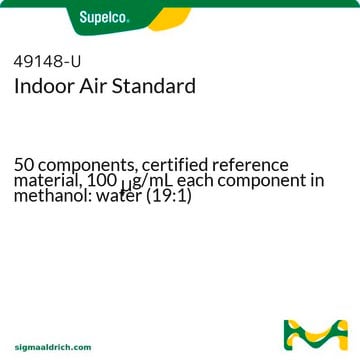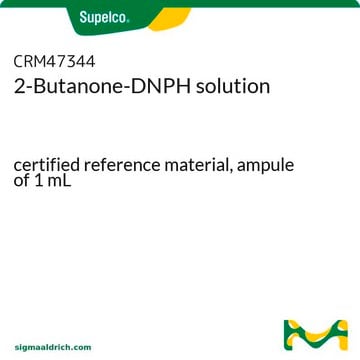48877
2-Butanone solution
certified reference material, 2000 μg/mL in methanol: water (9:1)
Synonym(s):
2-Butanone, Ethyl methyl ketone, MEK, Methyl ethyl ketone
About This Item
Recommended Products
grade
certified reference material
TraceCERT®
vapor density
2.49 (vs air)
vapor pressure
71 mmHg ( 20 °C)
product line
TraceCERT®
CofA
current certificate can be downloaded
autoignition temp.
960 °F
feature
standard type calibration
expl. lim.
10.1 %
packaging
ampule of 1 mL
concentration
2000 μg/mL in methanol: water (9:1)
technique(s)
HPLC: suitable
gas chromatography (GC): suitable
refractive index
n20/D 1.379 (lit.)
bp
80 °C (lit.)
mp
−87 °C (lit.)
density
0.805 g/mL at 25 °C (lit.)
application(s)
environmental
format
single component solution
storage temp.
2-30°C
SMILES string
CC(CC)=O
InChI
1S/C4H8O/c1-3-4(2)5/h3H2,1-2H3
InChI key
ZWEHNKRNPOVVGH-UHFFFAOYSA-N
Looking for similar products? Visit Product Comparison Guide
General description
Application
Other Notes
Legal Information
Signal Word
Danger
Hazard Statements
Precautionary Statements
Hazard Classifications
Acute Tox. 3 Dermal - Acute Tox. 3 Inhalation - Acute Tox. 3 Oral - Flam. Liq. 2 - STOT SE 1
Target Organs
Eyes
Storage Class Code
3 - Flammable liquids
WGK
WGK 2
Flash Point(F)
49.5 °F - closed cup
Flash Point(C)
9.7 °C - closed cup
Choose from one of the most recent versions:
Already Own This Product?
Find documentation for the products that you have recently purchased in the Document Library.
Customers Also Viewed
Our team of scientists has experience in all areas of research including Life Science, Material Science, Chemical Synthesis, Chromatography, Analytical and many others.
Contact Technical Service








